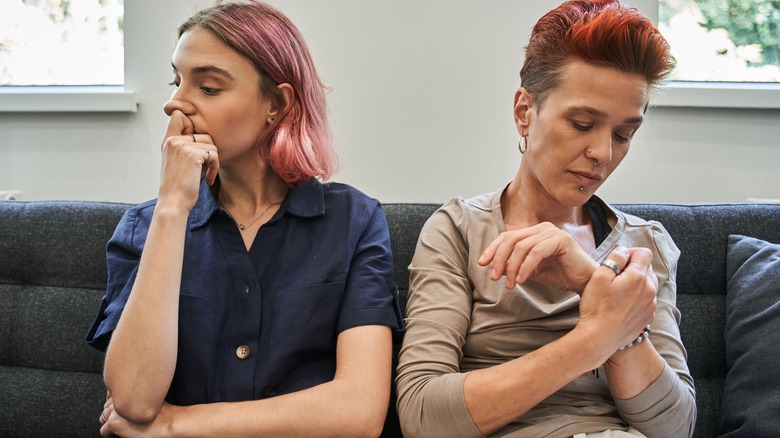Is 'Toxic Individualism' Hurting Your Relationship?
We may receive a commission on purchases made from links.
No couple begins a relationship or marriage expecting it to fail. They promise to love and support each other and build a future together. Yet over time, the promises can fade and the partners may drift apart. While a good fight can be just what a relationship needs to open up the lines of communication and address important issues, some couples have destructive arguments involving anger and blame — or they avoid fighting altogether and simmer in silence. Eventually, the relationship falls apart.
While some splits are definitely justifiable, others might be avoided with some work on the couple's part to realize where things have gone wrong. Some relationship experts suggest that faltering relationships are often the result of a "you and me" mindset, rather than one that prioritizes the "us" of a union. As humans, we're naturally social beings who have a need to feel connected. But when we focus too much on ourselves without considering how our partner might feel about our decisions and actions, that connection is lost. If our mate reacts badly to those actions, we might even come to think of them as the "bad guy" because they're standing in the way of what you need.
How can you move away from "me" and back to "we" in your relationship? It takes work, but the end result is worth it: a renewal of love and commitment.
Putting yourself first isn't always best
Marriage and family therapist Terrence ("Terry") Real believes our current culture is to blame for many damaged relationships. As he recently told CNN, we no longer live in a society where families and communities had to band together for mutual survival. Today, we're all about practicing good self-care and making sure our own needs are met, with or without a partner. But when we focus on ourselves without considering how our behavior affects our relationship, it becomes what Real calls "toxic individualism."
This individualism tends to be most harmful in times of conflict or stress. Real, author of the book "Us: Getting Past You and Me to Form a More Loving Relationship," suggests that people who haven't resolved the traumatic parts of their childhood get caught in what he calls the "Adaptive Child" mindset. When they encounter turmoil in their relationship, they fall back on the coping mechanisms learned from their parents, like anger or avoidance. It's an instinctive human reflex that protects us from hurt, but it also makes us forget how much we love our partner. It also creates a need to be right, as well as an atmosphere of blame: If my marriage is struggling, it's their fault because they're doing (or not doing) XYZ.
On the other end of the scale, when we act from a place of compassion and teamwork with our partner, we develop a more relaxed and flexible attitude that Real calls the "Wise Adult."
Use soft eyes to strengthen your bond
Healing your partnership starts with remembering that your mate isn't an adversary, but the other half of the team you've created together. Psychotherapist Daniel Watter, Ed.D., recommends looking at your spouse or partner with what he calls "softer eyes." It's his term for treating another person with compassion and understanding.
If your union is becoming increasingly stressed or argumentative, Terry Real also recommends modifying the way you react to your partner. His book gives an example of a husband who lied to his wife about even the smallest things; it was a habit he learned as a child to avoid his mother's explosive anger. Once he made a conscious decision to be honest, the trust and love in their marriage bloomed. If you find yourself behaving in the same way over and over again — withdrawing, silence, yelling — consider where that reaction comes from. Is it something you learned from your family? Then make a conscious choice to change that reaction in a supportive "wise adult" way.
It helps to frame your issues in terms of how they affect your relationship. For instance, instead of accusing, "You buy too many useless things," you might say, "I'd really like us to focus on saving for a house. Where could we cut back on our spending?" As Real once told CNN, "What matters is 'How are we going to work like a team to make this work for both of us?'"


